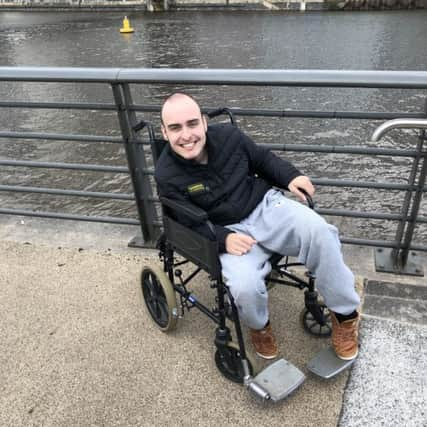Pioneering brain op in Yorkshire gives man his life back


Liam Carbery, 23, first started experiencing painful muscle spasms when he was two. By the age of 14 the condition deteriorated further, with the part of his brain being responsible for movement causing agonising symptoms such as bending of the trunk and splaying of his legs.
In 2013, at the age of 17 Liam was diagnosed with generalised dystonia, a rare incurable condition that causes abnormal movement.
Advertisement
Hide AdAdvertisement
Hide AdHe spent the next few years trying a number of trial medications and therapies, but it was all to no avail, and his condition got steadily worse with his spinal cord beginning to stretch over his spine.
The muscles in his throat that allow foods and liquids to move from the back of your mouth to your throat also started to contract, making eating and drinking impossible,so he had to have a feeding tube inserted directly into his stomach. In 2017 Liam from Dudley, was referred to the world-renowned neurosurgery team at Sheffield Teaching Hospitals, who were trialling a new type of surgery called deep brain stimulation. “I was admitted for five days of assessments with neurologists, specialist nurses and a psychologist to have functional and structural imaging of the brain under general anaesthetic. A month later I received the news that I would be listed for this potentially life-changing surgery. Even though brain surgery is very invasive, me and my family thought this was great as we now had some hope that this operation would give me some quality of life back.”
Deep brain stimulation is a specialist neurosurgical procedure undertaken by only a handful of leading centres in the UK. During the surgery a team of neurosurgeons, neurologists, neuropsychologists, neuroradiologists and specialist nurses skilfully implant electrodes on either side of the brain. Once implanted these electrodes are then connected to a ‘brain pacemaker’ device known as a neurostimulator.
This device in turn sends electrical impulses to specific targets in the deep structures of the brain that are thought to be responsible for controlling movement.
Advertisement
Hide AdAdvertisement
Hide AdFor Liam it’s meant the end of a life sentence of constant pain.
“Don’t think that my life isn’t incredibly difficult because it still is, but I have some quality of life back and I’d like to thank the specialist team at Sheffield Teaching Hospitals.”
Mr John Yianni, a consultant neurosurgeon at Sheffield Teaching Hospitals NHS Foundation Trust, said: “Until recently there were no useful treatments that could be offered to patients like Liam, but advances in technology mean that it is now possible to treat more patients who would previously have been deemed to have no hope of any relief from this terrible, progressive, intractable condition. To date we’ve treated over 500 patients with deep brain stimulation.”